Meet Shebna, a biblical character whose dramatic downfall offers captivating insights into prophetic condemnations and ancient politics; let's unravel his intriguing tale.

Who Is Shebna in the Bible
'Every cloud has a silver lining,' and this holds true while exploring the complex character of Shebna in the Bible.
You might wonder who this Shebna is? Well, he was a significant official during King Hezekiah's reign, his actions and eventual downfall provide us with intriguing insights into prophetic condemnations and the political atmosphere of that era.
But what led to his downfall and what lessons can we take away from his story? That's a journey we'll embark on, promising to unravel fascinating perspectives.
Key Takeaways
- Shebna was a significant official in King Hezekiah's court whose downfall was due to pride and ambition.
- His misuse of power and inability to trust God led to his replacement and demotion.
- Shebna's actions, such as building a grand tomb, were condemned and led to God's disapproval.
- His story serves as a biblical lesson about the importance of humility, integrity, and service in leadership.
Unveiling Shebna's Biblical Identity

To truly understand Shebna's role in biblical history, you've got to delve deep into the narrative tapestry of the Old Testament, analyzing each thread of detail that contributes to his complex identity. Shebna's character is intriguing, a composite of ambition, pride, and eventual downfall.
As the royal steward to King Hezekiah, Shebna's position was one of significant influence and power. However, his pride led to his downfall, a cautionary tale that resonates throughout biblical teachings. His overreaching ambition, demonstrated through his construction of a grand sepulcher, was ultimately his undoing. His actions revealed a man more concerned with his legacy and status than serving his king or God.
The biblical significance of Shebna's character lies in his portrayal as a warning against the dangers of pride and ambition. His story serves as a stark reminder of the consequences of prioritizing personal gain over service to others. Shebna's narrative provides insight into the biblical views on leadership, humility, and the dangers of self-aggrandizement. In this light, Shebna's character serves as a critical lesson in the broader narrative of the Bible, his life a testament to the destructive nature of unchecked ambition.
Shebna's Role in Hezekiah's Reign
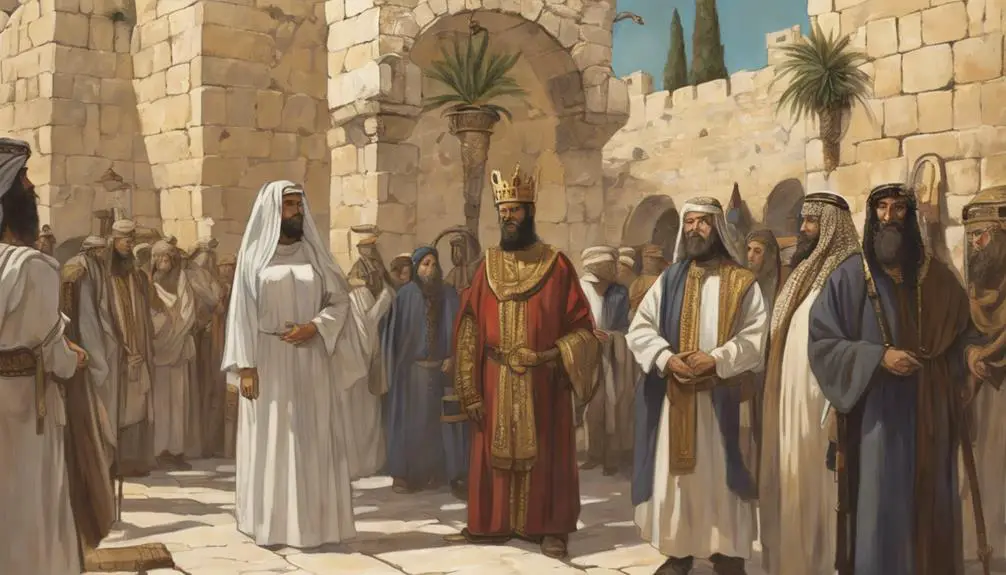
During King Hezekiah's reign, Shebna held a pivotal role as royal steward, a position that allowed him to wield considerable influence and power, shaping the trajectory of the kingdom in significant ways. His proximity to the throne put him smack-dab in the center of royal politics, maneuvering the levers of power with shrewdness and calculation.
But power can be intoxicating, and it's clear Shebna wasn't immune to its allure. As royal steward, he was supposed to be a servant of the king, but his actions suggested he saw himself as a kingmaker, if not a king in his own right. This hubris was his downfall. He came to see his position not as a responsibility, but as a means to personal aggrandizement, leading him down a path of pride and arrogance.
Shebna's downfall is a cautionary tale about the perils of power, demonstrating that those who forget their place and overreach can quickly find themselves toppled. His story serves as a stark reminder that true authority comes with humility, a lesson that resonates beyond the pages of the Bible.
Key Events in Shebna's Life
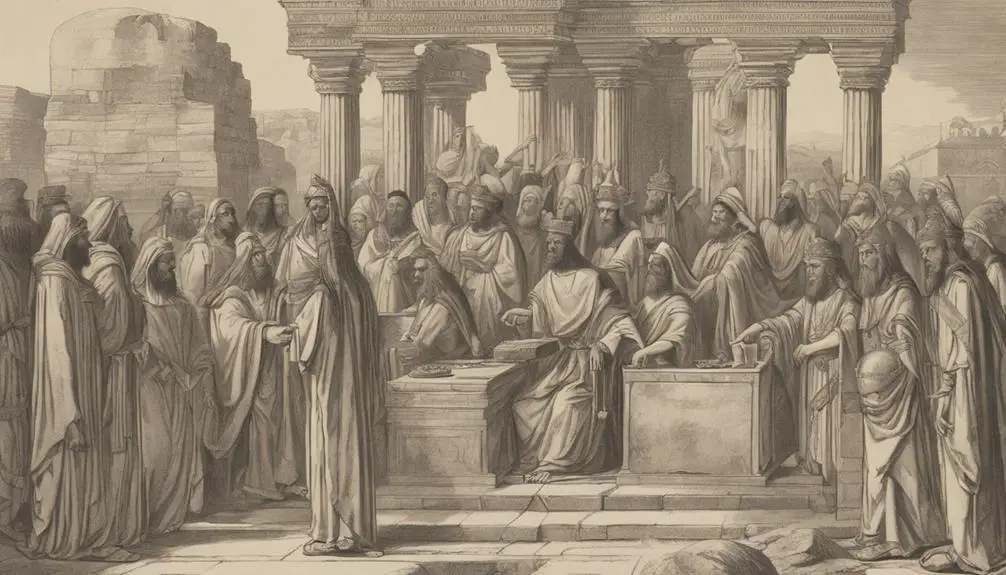
Delving into the life of Shebna, you'll find a string of key events that not only defined his role in biblical history but also shaped his personal journey from the height of power to the pit of downfall. Initially, Shebna was the royal steward, holding a position of significant influence in King Hezekiah's court. His life, however, took a drastic turn when he indulged in arrogance and pride, leading to Shebna's downfall.
Shebna's pride was evident when he commissioned a grand tomb for himself, a privilege reserved for royalty. This act of vanity didn't go unnoticed. One of Shebna's most significant encounters was with the prophet Isaiah, who prophesied his demotion and eventual exile. Isaiah's prophecy came true when Shebna was demoted from his high-ranking position, replaced by Eliakim as the royal steward.
Shebna's prophetic encounters and his downfall serve as pivotal moments in his life. They provide an insightful look into the dangers of pride and the inevitable consequences of arrogance. Understanding these key events in Shebna's life enriches our understanding of his role and significance in biblical narrative, while also offering timeless lessons in humility and servant leadership.
Interpretations of Shebna's Actions
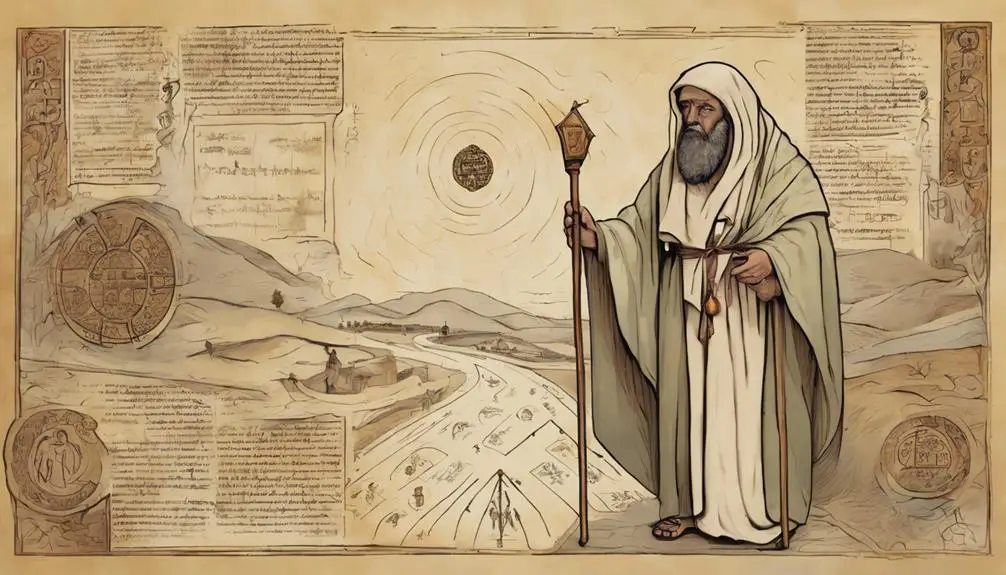
Building on our understanding of Shebna's key life events, we can now begin to analyze and interpret his actions, particularly his prideful behaviors and their consequences. Shebna's downfall was a direct result of his pride and misuse of power, which were strongly condemned in the Bible. One might wonder, what were the motivations behind his actions?
Let's delve deeper into this with the help of the following table:
Action |
Possible Motivation |
Consequence |
|---|---|---|
Building a grand tomb |
Vanity and pride |
God's disapproval |
Misuse of power |
Greed and ambition |
Demotion |
Failure to trust God |
Lack of faith |
Replacement |
The table helps you interpret Shebna's actions. His vanity led him to build a grand tomb, a symbol of status, which led to God's disapproval. His misuse of power, driven by greed and ambition, resulted in his demotion. Lastly, his lack of faith in God, marked by his reliance on alliances rather than divine intervention, led to his replacement.
Through this analysis, we gain deeper insights into Shebna's actions, motivations, and their dire consequences.
Lessons Learned From Shebna's Story
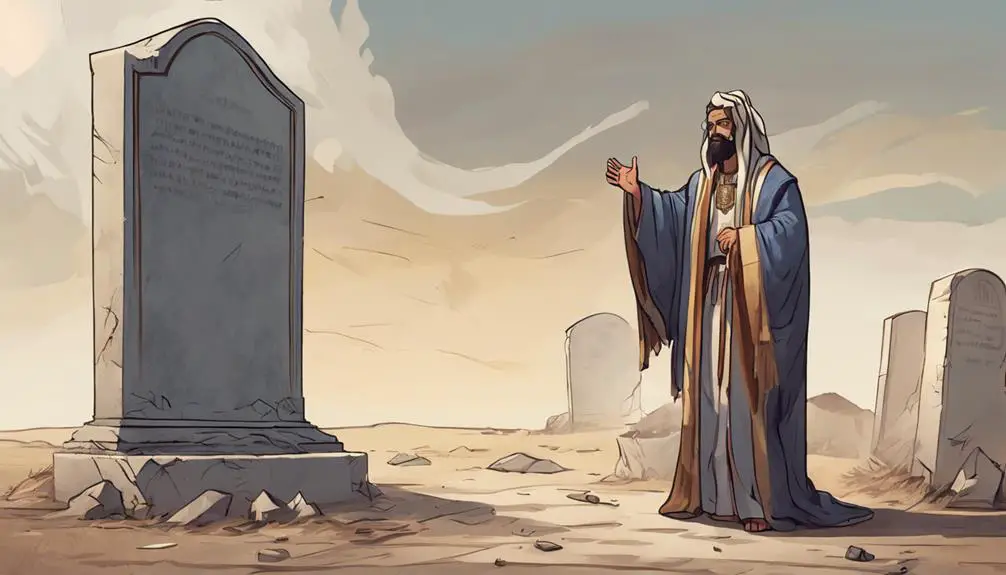
Reflecting on Shebna's story, you can glean important life lessons about the pitfalls of pride, the misuse of power, and the importance of faith in God. Shebna's pride led him to misuse his power, placing his personal interests above those of the people he was supposed to serve. His arrogance blinded him to the needs of others and caused him to disregard God's commandments.
Shebna's story serves as a stark reminder of the potential for moral downfall when pride and power go unchecked. His misuse of authority resulted in God's judgment and his eventual demotion. In the end, his self-serving actions led to his downfall, a clear illustration of the biblical principle that 'pride goes before a fall.'
The lessons from Shebna's story are as relevant today as they were in biblical times. It underscores the importance of humility, responsible use of power, and faith in God. It teaches you to beware of the destructive nature of pride and the danger of putting personal gain above service and duty. It's a cautionary tale that warns against disregarding God's commands and the consequences of moral downfall. It's a powerful reminder to always strive to lead with humility, integrity, and a heart for service.
Frequently Asked Questions
What Is the Significance of Shebna's Tomb and Inscription Found in Archaeology?"
Shebna's tomb and inscription, found through archaeology, hold great significance. They give you insight into Shebna's influence during his lifetime.
The tomb's iconography reveals details about the social and political climate of his era. It's a tangible piece of history, providing context and corroborating biblical accounts.
Was Shebna a Real Historical Figure or a Symbolic Character?"
You're delving into whether Shebna was a historical figure or just symbolic. Taking into account Shebna's influence, it's evident in biblical interpretations that he held significant power. Archaeological findings also support his existence.
However, some see his portrayal as symbolic—representing corrupt leadership. It's a complex question, balancing historical evidence with theological analysis. Ultimately, your perspective might depend on how you interpret historical data and biblical narratives.
What Was Shebna's Family Background and Early Life?"
You're curious about Shebna's family background and early life. It's not explicitly detailed in historical records. What's known is his occupation and influence. He held a high-ranking position, possibly a royal steward, in King Hezekiah's court. His influence was significant, as indicated by his audacious tomb inscription.
Despite the lack of specifics about his origins, Shebna's prominence in Jerusalem's political scene is evident.
Are There Any Specific Teachings or Parables Associated With Shebna in the Bible?"
You're asking about specific teachings or parables linked with Shebna. While Shebna's leadership in the Bible doesn't directly deal with parables, it offers valuable interpretations.
His story serves as a warning against pride and self-exaltation. It teaches that those who elevate themselves will be humbled, an important principle throughout the scriptures.
How Did Shebna's Story Influence the Religious Practices or Beliefs of His Time?"
You're asking about Shebna's influence and the religious repercussions of his story.
His tale, as a high-ranking official who fell from grace due to his arrogance, served as a warning to others. It reinforced the belief that pride and materialism were sinful, potentially leading to downfall.
Thus, it influenced religious practices of the time by strengthening the emphasis on humility and the dangers of hubris in the face of divine authority.
Conclusion
In the end, Shebna's story in the Bible teaches you about the pitfalls of pride and misuse of power. His actions under Hezekiah's reign and the subsequent consequences offer valuable lessons.
Interpreting Shebna's story helps you understand the importance of humility and righteous leadership. Remember, power is a test of character, and those who misuse it, like Shebna, may face severe repercussions.
Always strive for integrity and humility in your own leadership journey.


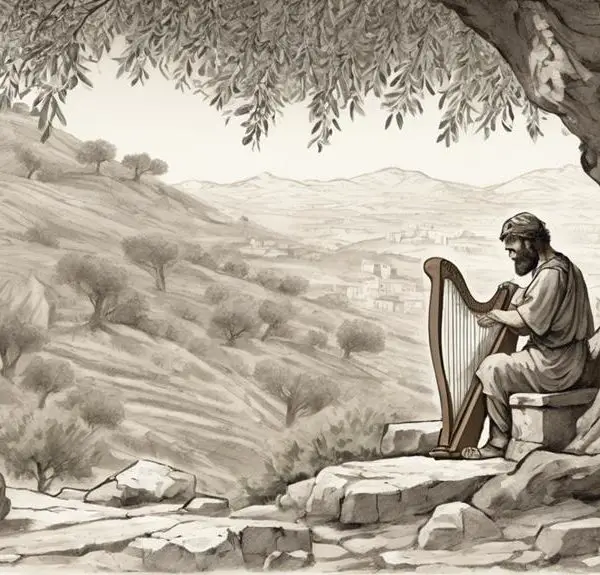
Sign up